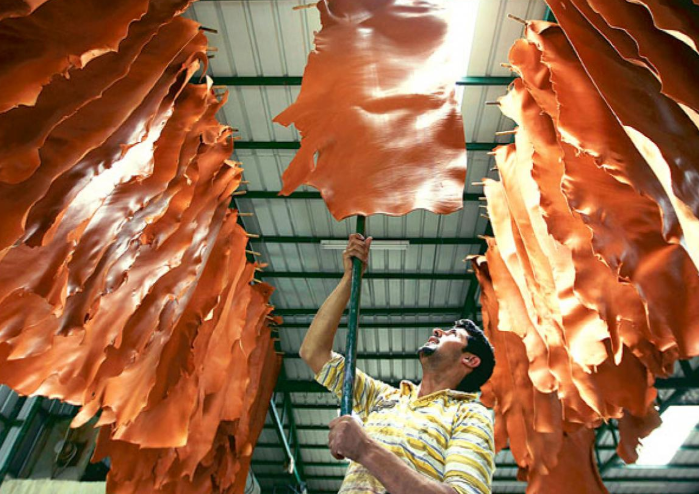UP: Kanpur’s Tattered Tanneries Tell Tale of Government Apathy and Neglect

Image for representational use only.Image Courtesy : BS
Lucknow: In what can only be termed as another major jolt to the leather industry in Kanpur, the industry suffered losses worth about Rs 2,100 crores due to the Uttar Pradesh government’s policies. Once known as home to India’s biggest textile and leather hub, the Bharatiya Janata Party-led government's policies are slowly killing what is left of the leather industry in the city.
Kanpur used to be one of the major industrial and employment hubs in India. However, over the past few years, the city has been undergoing a rather unfavourable transformation.
According to the Council for Leather Exports, Kanpur suffered a loss of business to the tune of nearly Rs 2,100 crore by the end of September. A significant reason was the Yogi Adityanath government's shutdown order on leather tanneries in Kanpur and Unnao at the beginning of the Kumbh Mela three months ago to cap pollution in the Ganga. While overseas buyers from Kanpur are turning to Bangladesh for raw material, manufacturers are moving to West Bengal.
The tanneries, which remained closed for a period of 13 months due to charges of polluting the river Ganga, faced heat by the National Green Tribunal (NGT). Given the situation, orders for exports have declined by almost 60% and buyers from Europe have turned to Bangladesh.
Javed Iqbal, regional chairperson for Council for Leather Exports in Kanpur, said Bangladesh and Pakistan have gained from Kanpur's loss. “We have a Rs 20,000-crore domestic business and Rs 8,000 crores worth of export business from Kanpur. With tanneries shut for two and a half years, the customer is not going to wait. They are procuring from Bangladesh – known for its soft leather – and Pakistan, famous for buffalo leather. The industry in Kanpur is down to zero with no production at all over the past two years,” Iqbal said.
Aside from businessmen resorting to buying from neighbouring countries, ancillary industries like chemical suppliers are also moving away since the demand for products has crashed. Hafizur Rehman, president of the Small Tanneries Association, questioned the government's intent to “destroy” a well-established industry while talking of 'Make in India'.
“Bangladesh was the only supplier of soft leather (made from goats) after India. The Magh Mela, Kumbh Mela and the strict approach of the NGT have led to the tanneries operating at a maximum of 50% capacity over two and a half years. In this situation, buyers from Europe turned to Bangladesh, which had incentivised packages. It reduced duty drawback to 15%. The effect was that Kanpur lost four big foreign brands. In addition, 32 tanners who had planned on expanding to here have signed an MoU for land in West Bengal. Four among them are expanding into Bangladesh,” Iqbal told NewsClick.
West Bengal has become the favoured destination for many tannery operators. Attractive land rates and sops by the government to promote the already flourishing industry in the state have seen close to 40 units move out of Kanpur since last year.
In mid-November 2018, around 300 tanneries operating in Kanpur, Unnao and Banthar were closed down ahead of the Kumbh as the district administration felt the industry failed to ensure effluent treatment before discharge. However, the UP government failed to provide any infrastructure back-up to the leather industry.
Nayyar Jamal, a member of the Kanpur-based Small Tanners’ Association told NewsClick that most tanneries had still not reopened since they were in the process of preparing their machinery for processing leather after a long hiatus.
“The government had ordered to shut down the tanneries a year ago; it was followed by the NGT order. Our machines like tannery drums and pedals were dismantled. How will we survive? Ever since the tanneries opened after the lockdown was imposed in June, we were only allowed to open them for 15 days in a month due to which our capacity is only 25%,” he said, adding that earlier one tannery had the capacity to produce 17,500 hides per day. However, capacity has declined now to about 8,750 per day.
The continued closure has resulted in a huge financial loss to local entrepreneurs, aside from loss of a permanent clientele, both national and international.
Businessmen from the industry said that the per capita income of Bangladesh has increased. The decline in business in India has led to a more than 40% decline in leather exports. A large part has been surrendered to Bangladesh. “The draw back on leather exports has now come down to two per cent. Tanneries are operating 15 days a month. Because of this, our costs have gone up and Bangladesh has come down by 20%,” Iqbal told NewsClick.
According to Jamal, nearly 50 of Kanpur’s tanneries have relocated to West Bengal owing to the periodic disruption in UP due to issues like pollution and supply of raw leather. The latter happened after the Yogi Adityanath government clamped down on illegal abattoirs.
Kanpur’s leather industry, including tanneries and leather goods manufacturers, is estimated to rake in about Rs 12,000 crore. The cluster generates Rs 8,000 crore worth of exports to Europe, China, Iran and the like.
Get the latest reports & analysis with people's perspective on Protests, movements & deep analytical videos, discussions of the current affairs in your Telegram app. Subscribe to NewsClick's Telegram channel & get Real-Time updates on stories, as they get published on our website.
























